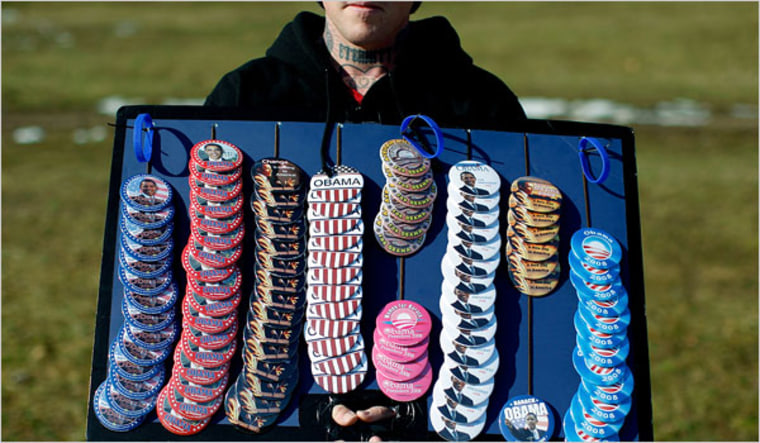Senator was an hour and a half late to a rally last week at , and the crowd was becoming bored. Suddenly, squeals and cheers erupted from a corner of the arena, and all 8,000 heads turned to catch a glimpse of the candidate.
But it was not Mr. Obama. Instead, it was a campaign worker, looking a bit frightened as a throng of Obama supporters lunged at him, desperate to get one of the campaign signs he clutched to his chest.
As the battle for the Democratic presidential nomination continues to draw enthusiasm and crowds, the campaigns of Mr. Obama, of Illinois, and his rival, Senator of New York, have experienced a serious shortage of “chum” — the stickers, lawn signs and T-shirts that political experts liken to the bloody bait that is supposed to drive sharks into a feeding frenzy.
The paraphernalia, given away at events and at storefront offices and sold on Web sites, have been a boon for the campaigns, their official vendors and unlicensed dealers, driving up enthusiasm, online donations and profits.
“I don’t think anybody anticipated the need for this sort of thing,” said Tony Baltes, president of Tigereye Design, which has sold Democratic merchandise for more than 30 years and fills all orders for the Obama campaign’s online store from a warehouse in Ohio.
Referring to the Obama campaign, Mr. Baltes said, “They’re in wonder like we are.”
Mr. Baltes said the Democratic presidential campaign had increased sales by 50 percent so far, and the past three months had been the company’s best ever. The company also sells unofficial campaign merchandise at .
Altogether, Mr. Baltes said, he sold eight million buttons in 2007 and has already sold two million this year, compared with five million for a typical presidential election cycle. He said demand was so huge that Obama campaign workers had at times run out of gear and asked the company to divert online store inventory to rallies in Iowa, New Hampshire and South Carolina. Online customers still have to wait as long as three weeks for some products.
“We’re getting kind of caught up now because not so many states are in play,” Mr. Baltes said. “After Ohio and Texas, we’re going to get to catch our breath.”
An Obama spokesman, Tommy Vietor, said the campaign’s online sales of gear hit $1.5 million in January, up from $380,000 in December. A recent St. Patrick’s Day-themed T-shirt — “O’Bama” — has been especially popular; 700 sold out within 24 hours.
In some cases, the demand has also led to an increase in prices.
For example, a limited edition print with Mr. Obama’s face and the word “hope,” produced by Shepard Fairey, a graffiti artist, originally sold for $25. With all 600 sold out, the pieces are now going for as much as $1,500 on eBay, Mr. Fairey said.
A Clinton campaign spokeswoman, Kathleen Strand, would not discuss sales figures for the candidate’s official store, , but said the free chum was in high demand.
Indeed, last week a volunteer at Clinton headquarters here was overheard complaining that fewer than 300 lawn signs were left heading into the weekend before the Ohio primary.
The unofficial vendors at campaign events are happy to make up for such shortages, and they are thrilled that the primary season has gone on so long.
“People have tried to take the hat off my head,” said Korlin Grays, 22, wearing an Obama baseball cap. Mr. Grays was selling unlicensed campaign gear Saturday night outside a high school in Parma Heights, Ohio, where Mr. Obama had just spoken.
“At events in downtown Cleveland, where the big spenders are,” Mr. Grays said, “we blow through 100 hats in one shot.”
Kofi Prempeh started making campaign shirts in his basement during the 2004 presidential election and now owns a small print shop in Cleveland. Mr. Prempeh said he had earned $7,000 in the last four months off Obama T-shirts, which go for $20 apiece. None of the proceeds go to the Obama campaign.
“I wish I could” give money to them, he said, “but we’re the working poor. I need every penny I can get.”
